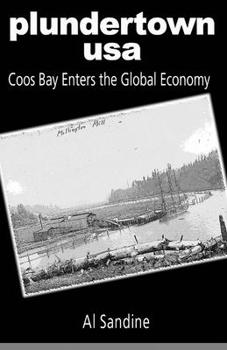Plundertown USA: Coos Bay Enters the Global Economy
Sandine recounts the story of Coos Bay's economic decline, illustrating the impact of economic globalization on a small Oregon community. He fills in background on the town's history, which he intertwines with his own autobiography and family history and supports with dozens of photographs. Annotati
Format:Paperback
Language:English
ISBN:0888395256
ISBN13:9780888395252
Release Date:May 2003
Publisher:Hancock House
Length:176 Pages
Weight:2.90 lbs.
Dimensions:0.4" x 5.5" x 8.5"
Customer Reviews
2 ratings
More than just local history.
Published by Thriftbooks.com User , 20 years ago
Sandine skillfully weaves several personal anecdotes into this narrative of the economic and social history of the Coos Bay region of southwest coastal Oregon. There are brief accounts of his having lived in North Bend, contiguous with Coos Bay, in the early 1950s, with later constrasting descriptions of the present-day distressed region as of early 2002. But the real subject of the book is the bigger picture of the rapid development by distant extractive industries of a west coast lumber port, with its subsequent boom-and-bust economy, and the implications for similar localities seeking job-creating ventures and increased payrolls by attracting remotely-based multinational interests. The author provides a detailed description of how prosperity for this one locality, so dependent on the exploitation and shipping of forest products, was only intermittently sustained. Today, Coos Bay is a city that has yet to come to terms with the implications of its own unstable dependence on short-term "job-creating" ventures.The book is particularly admirable for its all-encompassing point of view, where the author steps back to visualize the regional socio-economic history of southwest Oregon in the context of the national or global economy. While the tone is somber, the argument is disciplined and suggests a sense of wonder at the severity of the many changes endured by this gritty working community. This reader agrees with the author that the fascinating history of the Coos Bay/North Bend area presents a rich vein for historians and economists. This is a thoughtful and compelling local history that should have a broad appeal, even for those with an interest in labour and industry studies, or in the forest resources of the Pacific Northwest. It particularizes the geography of industrial work, and serves as a timely warning that industrial location is seldom permanent and is always subject to downsizing. Indeed, in resource extraction industries, plant shutdowns are likely eventualities for all localities embraced by corporate globalization. In fact, one of the more interesting themes in Sandine's study is that in a retrospective sense every one of the major players in Coos Bay's history--from shrewd and calculating pioneer lumber and shipping merchants such as Asa Mead Simpson to multinational lumber product enterprises such as Georgia-Pacific--were always conceptualizing their immediate future in hemispheric or global terms while acquiring and managing what was originally a public domain as a resource to be privately abused. Yet at the local level there was seldom any effort to understand the long-term implications of this form of transnational capitalism. In its final chapters the book considers the historic absence of local interest group linkage and the deference and unassertiveness on the part of local development councils. It mentions occasional efforts at joint forest management, and a few of the largely ineffective campaigns to ameliorate the soc
A Tale for Our Times
Published by Thriftbooks.com User , 21 years ago
Plundertown was my summer vacation book, and should be on everyone's wish list, especially those concerned about the environment, globalization, West Coast history, and a tale that has the dark drama of a well-written expose. The author has skillfully woven personal, political, socio-cultural, historical, and economic threads into a very engaging, compact narrative that starts with vividly recallled childhood memories of growing up in Coos Bay, then takes the reader on a wide-ranging epic journey that expands out to San Francisco and other urban centers of industry and finance, back in time when native peoples lived in harmony with nature and the forest, and forward to the time when nature had been exploited by buisness barons, and left barren for future generations. Chapters are short, densely packed with well-researched information, and provide a vivid and convincing saga of the human and environmental wounds that occur when business colonizes and exploits for economic gain. Because the tale is very local and personally felt by the author, the reader is able to live through a sequence of events that is being repeated in our time, in many parts of the world. The costs of globalization and economic exploitation become very real, not just abstract political rhetoric. Highly recommended.





